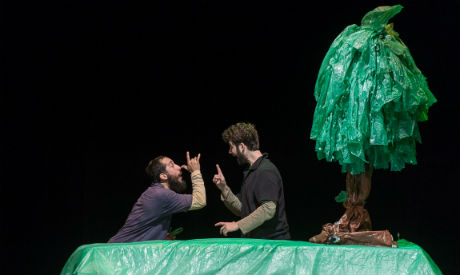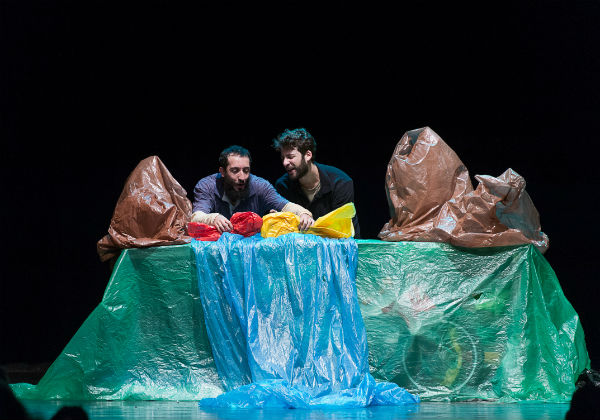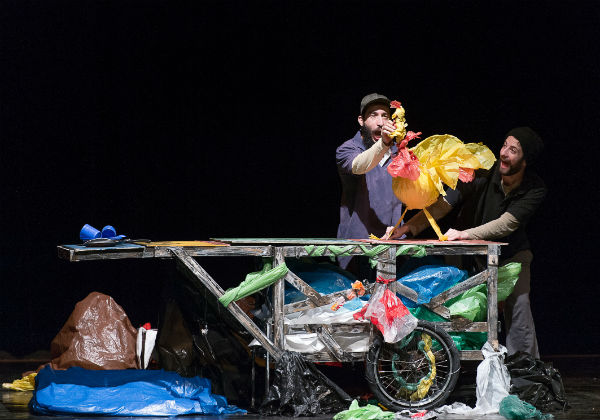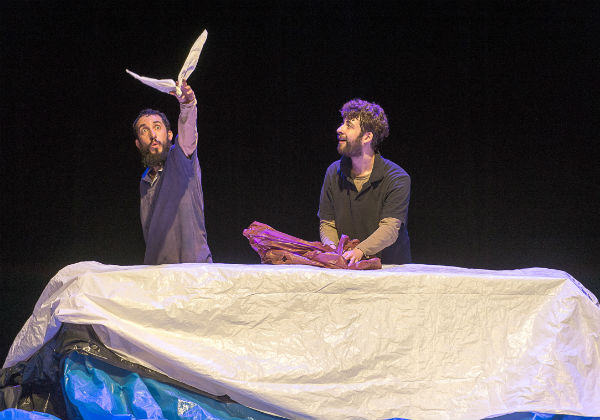
Pacific Expedition (Photo: Bassam Al Zoghby)
“We wanted to cross the barriers of language and create a universal message,” stated Gabriel Sitchim, co-star of the Brazilian show Pacific Expedition, which is participating in the 25th edition of the Cairo International Festival for Contemporary & Experimental Theatre (10-21 September).
The play is co-starred by Rogerio Uchoas and directed by Helm Homrique Sitchism, who unfortunately could not accompany his play to the 25th edition of the festival . It centers around the question of garbage, while focusing on one single material: plastic. People consider that their use of plastic is normal and has no ecological consequences, but in reality, they simply ignore the danger.
The play is performed by two actors playing the characters of cart pushers handling plastic. In Brazil specifically, the cart pushers are not considered workers, but are rather marginalized and invisible. Shedding light onto this issue was the motivation pushing the actors to write and act the play.
“We studied miming, body movement, and clown motion and made our own objects using plastic to utilize on stage,” said co-star Rogerio Uchoas.

Pacific Expedition (Photo: Bassam Al Zoghby)
The concept is simple: the garbage that we throw away does not vanish from the planet, but is actually gathered in a huge pile in the Pacific Ocean that forms a mountain called the Greater Trash Island, an island composed mainly of plastic. Its area is three times the size of France.
The cart pushers, after a hard day of work, fall asleep and make an imaginary journey to the island. They get creative with plastic, creating a ballerina for entertainment, a chicken and an egg for nourishment, and a stove to cook with. It's a normal, imaginary life surrounded by plastic on trash island.
The actors’ facial expressions, sounds, and the music, combined with the lights, help symbolize the struggle and add meaning, helping to make the performance clear to the audience.
The music varies between a mix of tango and train sounds, sometimes soothing, but loud and disturbing in other times. It sets a joyful mood when wanted and a sad one when needed to push the audience to realize the pressing problem that humanity is facing: our world will become trash if we don’t deal with the problem.

Pacific Expedition (Photo: Bassam Al Zoghby)
In this performance, the music’s role contributes to the success of the play as much as the actors. It explains the emotions and is capable of setting the audience in the exact frame of mind intended to understand the play and the message. The audience’s response on opening night was full engagement and enthusiasm.
The intelligence of the performers and the script was obvious in the end when the final message was spoken in Arabic, as the language was the message, not the spoken words.
“The Great Trash Island in the Pacific Ocean is a fact, there are those who will insist to resist that fact and those who will dare to transform it into something better,” Uchoas concludes.

Pacific Expedition (Photo: Bassam Al Zoghby)
For more arts and culture news and updates, follow Ahram Online Arts and Culture on Twitter at @AhramOnlineArts and on Facebook at Ahram Online: Arts & Culture
Short link: